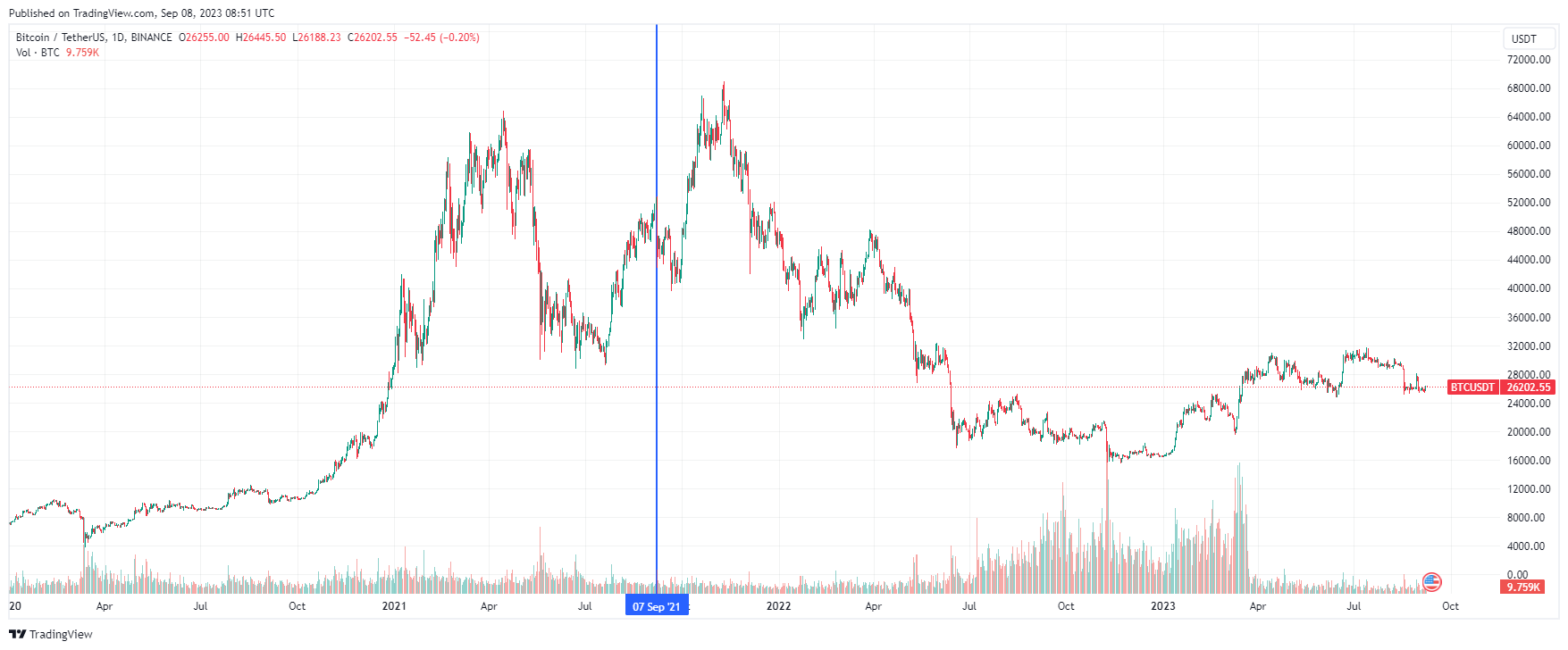Сальвадор первым в мире сделал биткоин национальной валютой. Редакция BeInCrypto решила выяснить, как в стране обстоят дела с криптоплатежами спустя два года после легализации BTC.
Что сделал Сальвадор, чтобы биткоин «прижился»
7 сентября 2021 года биткоин, наравне с долларом США, стал национальной валютой Сальвадора. Власти страны стали первопроходцами в признании BTC официальным платежным средством на национальном уровне. Вот что предприняли местные регуляторы, чтобы «приучить» граждан к криптоплатежам и поставить экономику на крипторельсы:
- запустили официальный криптокошелек Chivo;
- провели разъяснительную работу с населением;
- раздали пользователям криптокошелька Chivo по $30 в биткоинах;
- установили на улицах городов криптобанкоматы;
- создали центры, в которых граждане Сальвадора могут получить консультацию по работе с криптовалютами;
- открыли биткоин-посольства;
- анонсировали строительство биткоин-сити;
- запустили майнинг биткоина внутри страны;
- начали создавать тематические места и достопримечательности, ориентированные на участников криптосообщества;
- организовали регулярные закупки биткоинов;
- запустили программу лицензирования криптобирж;
- создали узкоспециализированный регулятор — Национальный офис по биткоинам (ONBTC), задача которого — контролировать криптоинициативы в стране;
- организовали запуск биткоин-бондов.
Интересно! По состоянию на момент написания обзора, под контролем Сальвадора 2381 биткоинов. Для сравнения, у властей США — 207 189 BTC.
Рейтинг стран, под контролем властей которых находится наибольшее количество биткоинов.

Также местные власти предложили выдавать гражданство в обмен на инвестиции, привлекая тем самым интерес общества к своим криптоинновациям.
На фоне легализации криптовалюты в СМИ появились сообщения о грядущем дефолте первой биткоин-страны. Президент Сальвадора Найиб Букеле поднял на смех авторов негативных прогнозов.
Насильно мил не будешь
В СМИ периодически появляются новости о том, что биткоин-революция в стране пошла не по плану. Например, в ноябре 2022 года Bloomberg писал, что криптовалютой в Сальвадоре пользуются единицы. А те немногие, кто поверил властям и закупился биткоином, потеряли деньги на фоне общего падения крипторынка.

Вертикальная линия — дата легализации биткоина в Сальвадоре. График биткоина: TradingView
Подтверждение статистики, согласно которой местные граждане спустя два года не торопятся переходить на биткоин, можно найти на YouTube-каналах криптоэнтузиастов. Вот пример документального фильма, снятого летом 2023 года, авторы которого пришли к выводу о том, что криптоплатежи в Сальвадоре не пользуются популярностью:
По данным СМИ, биткоину доверяет меньше трети граждан Сальвадора. Поэтому в стране невозможно выжить без классических денег. Одна из причин — местные не увидели экономического эффекта от легализации криптовалюты. У властей другое мнение. В феврале 2022 года регуляторы заявили о 30% росте туризма на фоне признания биткоина национальной валютой. Впрочем протесты, участники которых добиваются отмены курса Сальвадора на дальнейшее внедрение биткоина в экономику, говорят о том, что биткоинизация, все же, идет не по плану:
В 2023 году немногочисленные участники криптосообщества столкнулись с еще одной проблемой — увеличением расходов на фоне роста комиссий в сети BTC. Одна из последних вспышек роста стоимости транзакций пришлась на май. Причина — хайп вокруг протокола Ordinals, при помощи которого можно создавать NFT в сети биткоина.
В результате и без того низкая активность криптосообщества Сальвадора упала еще сильнее. В апреле 2023 года в СМИ появилась информация о том, что доход властей страны от биткоин-сделок, которые проводят в Chivo, снизился почти на 20%.
Несмотря на убытки из-за падения курса BTC и отказ большинства граждан страны от работы с криптовалютой, по данным СМИ, Букеле продолжает придерживаться криптопрограммы.
Что в итоге
За два года активной популяризации криптоплатежей в Сальвадоре властям удалось перевести на расчеты в биткоине лишь небольшой процент населения. Местные не доверяют криптовалютам и хотят, чтобы власти отказались от криптоинициатив. Регуляторы, в свою очередь, отчитываются о росте туризма и рассказывают о планах продолжить биткоинизацию Сальвадора.
Можно предположить, что неудачи местных властей, в том числе, связаны с тем, что период интеграции биткоина в экономику страны пришелся на падение рынка цифровых активов. Вероятно, на фоне перехода BTC в фазу роста часть граждан Сальвадора «потеплеет» к криптоинициативам своего президента.


